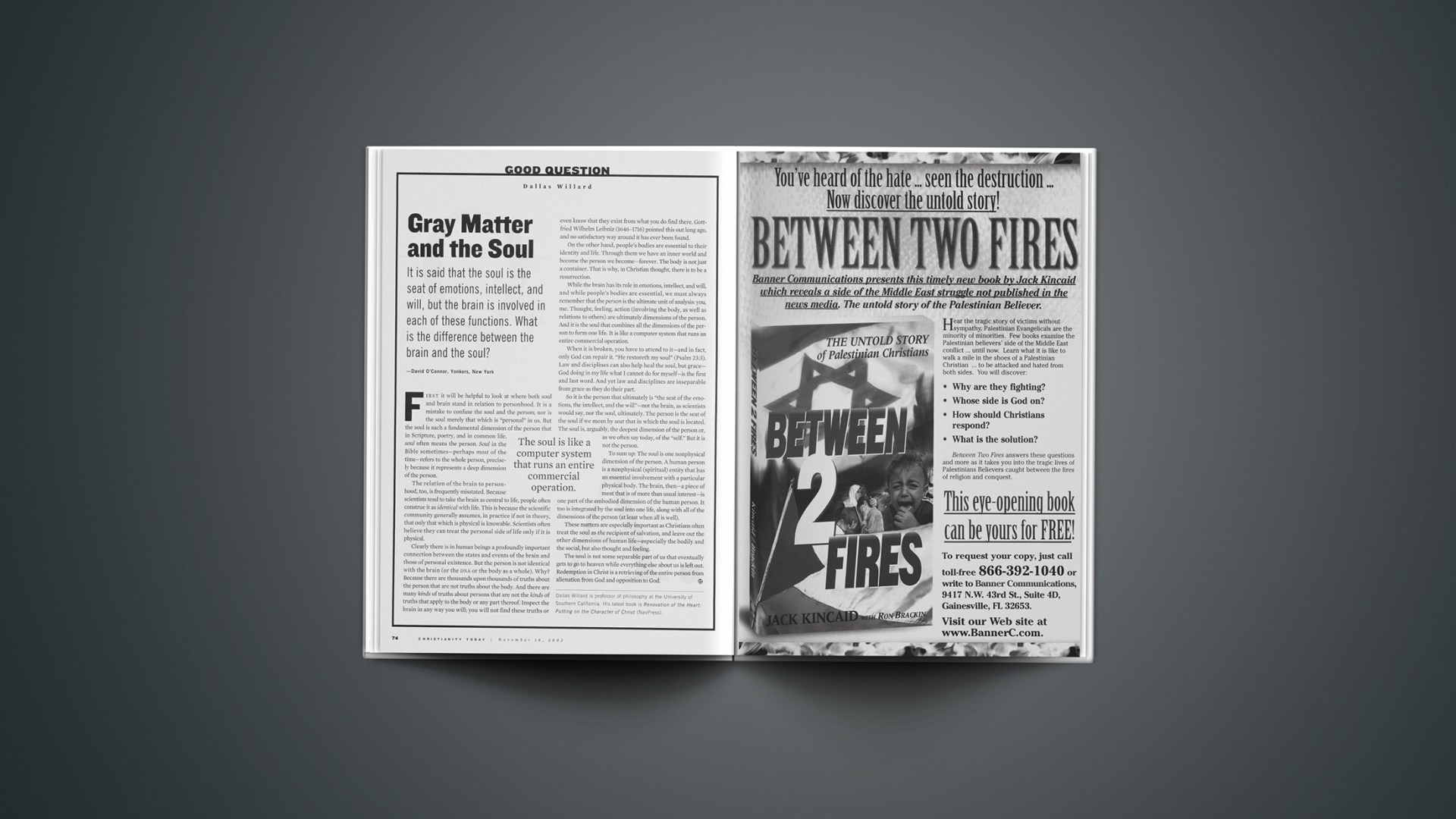David O’Connor, Yonkers, New York
First it will be helpful to look at where both soul and brain stand in relation to personhood. It is a mistake to confuse the soul and the person; nor is the soul merely that which is “personal” in us. But the soul is such a fundamental dimension of the person that in Scripture, poetry, and in common life, soul often means the person. Soul in the Bible sometimes—perhaps most of the time—refers to the whole person, precisely because it represents a deep dimension of the person.
The relation of the brain to personhood, too, is frequently misstated. Because scientists tend to take the brain as central to life, people often construe it as identical with life. This is because the scientific community generally assumes, in practice if not in theory, that only that which is physical is knowable. Scientists often believe they can treat the personal side of life only if it is physical.
Clearly there is in human beings a profoundly important connection between the states and events of the brain and those of personal existence. But the person is not identical with the brain (or the DNA or the body as a whole). Why? Because there are thousands upon thousands of truths about the person that are not truths about the body. And there are many kinds of truths about persons that are not the kinds of truths that apply to the body or any part thereof. Inspect the brain in any way you will; you will not find these truths or even know that they exist from what you do find there. Gottfried Wilhelm Leibniz (1646-1716) pointed this out long ago, and no satisfactory way around it has ever been found.
On the other hand, people’s bodies are essential to their identity and life. Through them we have an inner world and become the person we become—forever. The body is not just a container. That is why, in Christian thought, there is to be a resurrection.
While the brain has its role in emotions, intellect, and will, and while people’s bodies are essential, we must always remember that the person is the ultimate unit of analysis: you, me. Thought, feeling, action (involving the body, as well as relations to others) are ultimately dimensions of the person. And it is the soul that combines all the dimensions of the person to form one life. It is like a computer system that runs an entire commercial operation.
When it is broken, you have to attend to it—and in fact, only God can repair it. “He restoreth my soul” (Psalm 23:3). Law and disciplines can also help heal the soul, but grace—God doing in my life what I cannot do for myself—is the first and last word. And yet law and disciplines are inseparable from grace as they do their part.
So it is the person that ultimately is “the seat of the emotions, the intellect, and the will”—not the brain, as scientists would say, nor the soul, ultimately. The person is the seat of the soul if we mean by seat that in which the soul is located. The soul is, arguably, the deepest dimension of the person or, as we often say today, of the “self.” But it is not the person.
To sum up: The soul is one nonphysical dimension of the person. A human person is a nonphysical (spiritual) entity that has an essential involvement with a particular physical body. The brain, then—a piece of meat that is of more than usual interest—is one part of the embodied dimension of the human person. It too is integrated by the soul into one life, along with all of the dimensions of the person (at least when all is well).
These matters are especially important as Christians often treat the soul as the recipient of salvation, and leave out the other dimensions of human life—especially the bodily and the social, but also thought and feeling.
The soul is not some separable part of us that eventually gets to go to heaven while everything else about us is left out. Redemption in Christ is a retrieving of the entire person from alienation from God and opposition to God.
Dallas Willard is professor of philosophy at the University of Southern California. His latest book is Renovation of the Heart: Putting on the Character of Christ (NavPress).
Copyright © 2002 Christianity Today. Click for reprint information.
Related Elsewhere
Earlier Good Question columns include:
Is there a biblical principle behind the punishment of those who break the law?
Won’t heaven’s joy be spoiled by our awareness of unsaved loved ones in hell?
Where exactly do “Oneness” Pentecostals stand in relation to orthodoxy?
Do a man and a woman become married after having sex or after exchanging vows?
Can We Expect God to Forgive Unbelievers Who ‘Don’t Know What They’re Doing’?










